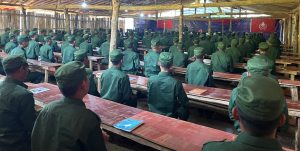Myanmar’s military has taken part in China-brokered peace talks with representatives of an alliance of ethnic minority armed groups that has made significant territorial gains since late October, the military and Chinese government confirmed yesterday.
Fighting has been raging in Shan State since late October, when the Three Brotherhood Alliance – made up of the Myanmar National Democratic Alliance Army (MNDAA), Arakan Army (AA), and the Ta’ang National Liberation Army (TNLA), launched an offensive across the northern part of the state. The offensive has made significant gains, with the MNDAA now poised to launch attacks on Laukkai, the capital of the Kokang region, which is currently run by a Border Guard Force (BGF) aligned with the military. All told, the Alliance’s gains have posed the military junta its greatest military challenge since its seizure of power in February 2021.
The negotiations between the military and the Alliance were announced by Chinese Foreign Ministry spokesperson Mao Ning at a news conference in Beijing yesterday, the AFP news agency reported. She said that China was “happy to see the parties to the conflict in northern Myanmar hold peace talks and achieve positive results.”
“We believe that the easing of the situation in northern Myanmar serves the interests of all parties in Myanmar and is conducive to maintaining tranquillity and stability along the China-Myanmar border,” Mao said. She added that Beijing would “continue to provide support and facilitation to this end.”
The talks, whose location has not been made public, were subsequently confirmed yesterday by Maj. Gen. Zaw Min Tun, the military government’s spokesperson. According to The Associated Press, he gave a statement to Myanmar state television confirming that junta negotiators had held a China-brokered dialogue with representatives of the Three Brotherhood Alliance. He said that another meeting would take place soon but gave no details. “I would like to say that based on the progress of these discussions, there will be further discussions around the end of this month,” he said, as per the AP.
Ye Myo Hein, an analyst who holds fellowships at the Wilson Center and at the United States Institute of Peace, posted on X (formerly Twitter) yesterday that China’s intervention had prompted the MNDAA “to agree a temporary ceasefire with the military in Kokang until Dec 30, reportedly aiming to facilitate the exit of the military’s civil servants from Laukkai.” He added that, despite “recent talks with the military in China,” the TNLA and AA were continuing their fight.
The pause in fighting will no doubt come as a relief to the tens of thousands who have been displaced since the launch of Operation 1027, and will allow humanitarian relief efforts of some kind to proceed. More than half a million people are estimated to have been displaced in the current campaign, the U.N. Office for the Coordination of Humanitarian Affairs stated last week, “although figures are fluid due to returns and redisplacement, while communication challenges are making numbers difficult to verify.” This comes on top of the 2 million-odd people displaced prior to the offensive.
“These IDPs are predominantly being sheltered in religious compounds, host communities, or are staying in informal sites in forested areas or paddy fields near the China-Myanmar border,” OCHA said.
It is no surprise that the Myanmar military would welcome a pause in the fighting, given the serious setbacks that it has suffered across northern Shan State. A delay could potentially allow it to marshal the forces necessary to hold on to what parts of northern Shan State remain under its control, if not to launch a decisive counteroffensive against the Three Brotherhood Alliance.
China, too, has good reasons to seek to end the fighting, which has disrupted cross-border trade and threatened to embroil Chinese citizens. In line with its coldly pragmatic approach to events in northern Myanmar, Beijing is likely not seeking or expecting a comprehensive solution to conflict in Shan State; rather it desires a stabilizing pact that will allow trade to resume and, in time, permit the advance of critical infrastructure projects connecting its Yunnan province to Myanmar’s Indian Ocean coast.
The issue of cross-border criminality, particularly the scourge of giant online scamming operations based in Laukkai, may also be playing into China’s calculations. Since before the launch of Operation 1027, Beijing was pressuring the Myanmar military to hand over suspected scammers, a goal that the MNDAA later declared as one of the operation’s goals, in large part to ensure Beijing’s passive support for the offensive. As Operation 1027 gained ground, the Myanmar military belatedly conceded and began deporting large numbers of suspected Chinese criminals. During the upcoming pause, it would not be surprising to see additional deportations.
It is less clear what incentive the Alliance has to take part in talks. Six weeks after the launch of Operation 1027, the MNDAA is poised to seize Laukkai and complete its reconquest of Kokang, from which it was driven by the Myanmar military in 2009. At the same time, the ethnically Chinese MNDAA leadership cannot afford to ignore Beijing’s wishes, and if conceding the Chinese government’s desire for peace talks is the price of staying in its good graces, it is probably a price worth paying.
However, it is unlikely that these negotiations will lead to anything more than a temporary pause in the fighting. About the best that can be assumed is a pause in conflict until the end of the year, when the MNDAA will resume its inexorable march on Laukkai.

































